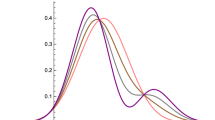Abstract
Dirac delta function of matrix argument is employed frequently in the development of diverse fields such as Random Matrix Theory, Quantum Information Theory, etc. The purpose of the article is pedagogical, it begins by recalling detailed knowledge about Heaviside unit step function and Dirac delta function. Then its extensions of Dirac delta function to vector spaces and matrix spaces are discussed systematically, respectively. The detailed and elementary proofs of these results are provided. Though we have not seen these results formulated in the literature, there certainly are predecessors. Applications are also mentioned. For example, we derive the probability density functions of two independent random unit vectors in the (real and complex) Euclidean spaces.
Similar content being viewed by others
References
Lovas, A., Andai, A.: Volume of the space of qubit-qubit channels and state transformations under random quantum channels. Rev. Math. Phys. 30 (10), 1850019 (2018)
Christandl, M., Doran, B., Kousidis, S., Walter, M.: Eigenvalue distributions of reduced density matrices. Com. Math. Phys. 332, 1–52 (2014)
Harish-Chandra: Spherical functions on a semisimple lie group, I. Amer. J. Math. 80, 241–310 (1958)
Hoskins, R.F.: Delta Functions: An Introduction to Generalised Functions, 2nd edn., vol. 2009. Woodhead Publishing Limited, Oxford (2011)
Itzykson, C., Züber, J.B.: The planar approximation. II. J. Math. Phys. 21, 411–421 (1980)
James, A.T.: Distributions of matrix variates and latent roots derived from normal samples. Ann. Math. Stat. 35(2), 475–501 (1964)
Kumar, S.: Eigenvalue statistics for the sum of two complex Wishart matrices, Europhys. Lett. 107, 60002 (2014)
Nguyen, H.C., Gühne, O.: Some quantum measurements with three outcomes can reveal nonclassicality where all two-outcome measurement fail. arXiv:2001.03514
Mathai, A.M.: Jacobians of matrix transformations and functions of matrix arguments world scientific (1997)
Mejía, J., Zapata, C., Botero, A.: The difference between two random mixed quantum states: exact and asymptotic spectral analysis. J. Phys. A : Math. Theor. 50, 025301 (2017)
Zhang, L.: Volumes of orthogonal groups and unitary groups. arXiv:1509.00537
Zhang, L.: Average coherence and its typicality for random mixed quantum states. J. Phys. A Math. Theor. 50, 155303 (2017)
Zhang, L., Xiang, H., Li-Jost, X., Fei, S.-M.: Incompatibility probability of random quantum measurements. Phys. Rev. E 100, 062139 (2019)
Życzkowski, K., Słomczynski, W.: Induced measures in the space of mixed quantum states. J. Phys. A : Math. Gen. 34, 7111 (2001)
Author information
Authors and Affiliations
Corresponding author
Additional information
Publisher’s Note
Springer Nature remains neutral with regard to jurisdictional claims in published maps and institutional affiliations.
Rights and permissions
About this article
Cite this article
Zhang, L. Dirac Delta Function of Matrix Argument. Int J Theor Phys 60, 2445–2472 (2021). https://doi.org/10.1007/s10773-020-04598-8
Received:
Accepted:
Published:
Issue Date:
DOI: https://doi.org/10.1007/s10773-020-04598-8



